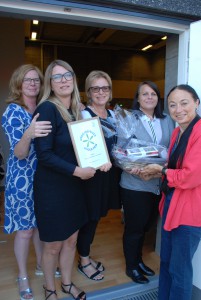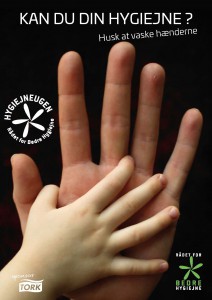The Hygiene Week is an umbrella for health promotion and prevention activities every year in week 38. Organized by the Danish NGO, Danish Council for Better Hygiene, the campaign week involves joint communication, joint messages, joint creation of materials – thus creating a joint umbrella for firebrand HCPs or others wanting to make a positive difference in breaking the chain of infection or just simply protect others.
The Council for Better Hygiene decide the theme and slogan for each year and then co-create campaign material and events with previous participants or new arrivals. We gather materials of own production, supplement with relevant material from health authorities, collaborating partners, or the like – and then send a package of event-in-a-box to the participants; containing posters, stickers, t-shirts, caps, postcards, leaflets etc – in addition we arrange handwashing events, a national conference and an award (Danish Hygiene Award) to underline our message.
During the week the council organize media and citizen interest to boost impact, and also take time to push decision makers in supporting the issue.
Act local – think global
The true value of the campaign is strong local commitment. By creating a good (inter-)national frame, the Council is able to engage and commit local participants to create events, dances, competitions, seminars, videos, interventions, etc in kindergartens, schools, workplaces, nursing homes, city halls, shopping malls, town squares, and more. And via media (traditional and social) we reach additional thousands or indeed millions.
Variation by theme
The Hygiene Week changes theme every year, but always focuses on this; how hygiene as a tool can help all individuals to stay safe and healthy – and/or help others to do the same.
Our target audience are three:
1.Citizens who should always consider hygiene an essential tool to ensure health
2. HCPs that can take pride in their work as lifesavers – getting some well earned spotlight this week.
3. Danish and Swedish decision makers – in the sense that by showing how widespread support and interest for hygiene really is, then better education, better training, better funding, and better priority for prevention might come about.



